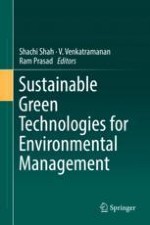2019 | OriginalPaper | Buchkapitel
10. Microbial Fuel Cell: Sustainable Green Technology for Bioelectricity Generation and Wastewater Treatment
verfasst von : Shachi Shah, V. Venkatramanan, Ram Prasad
Erschienen in: Sustainable Green Technologies for Environmental Management
Verlag: Springer Singapore
Aktivieren Sie unsere intelligente Suche, um passende Fachinhalte oder Patente zu finden.
Wählen Sie Textabschnitte aus um mit Künstlicher Intelligenz passenden Patente zu finden. powered by
Markieren Sie Textabschnitte, um KI-gestützt weitere passende Inhalte zu finden. powered by
